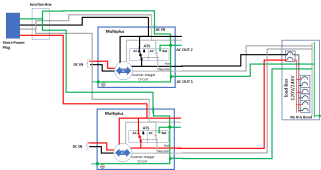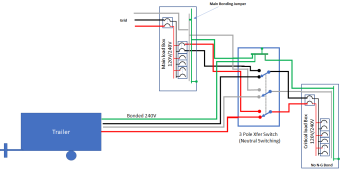Watts Happening
I call it like I see it.
- Joined
- May 3, 2022
- Messages
- 797
I've got a bit of a head scratcher here, at least I think. I've got a trailer that will have (2) Victron Multiplus-II 48v/3000 inverters, they'll be in split phase feeding a breaker panel inside the trailer. Being that this is the "main panel" of the trailer, I would expect to be installing a ground neutral bond screw in the panel as you'd see in a typical residential main panel. I'll obviously ground the breaker panel and inverter cases to the frame of the trailer. If any of this seems incorrect, please let me know.
The part that has me really wondering is; I'll be setting the trailer up to have an exterior 240v plug, this will be used if we lose power in our home, in this context consider the trailer, it's batteries and inverters as a "generator" to the house. If running a generator cord from the side of the trailer, to a generator inlet on the house, how would this affect my previously mentioned grounding/bonding situation? At that point I suppose the house becomes a sub panel, with the trailer being the main panel. I can't quite decide how this should be handled wiring wise?
A generator providing power to a house generally doesn't have any type of grounding, at least most scenarios I see. I would think the generator is getting its ground from the house's ground via the extension cord. I imagine that's what would happen to my inverters as well, but, I don't know how that would affect the panel inside the trailer.
Thoughts?
The part that has me really wondering is; I'll be setting the trailer up to have an exterior 240v plug, this will be used if we lose power in our home, in this context consider the trailer, it's batteries and inverters as a "generator" to the house. If running a generator cord from the side of the trailer, to a generator inlet on the house, how would this affect my previously mentioned grounding/bonding situation? At that point I suppose the house becomes a sub panel, with the trailer being the main panel. I can't quite decide how this should be handled wiring wise?
A generator providing power to a house generally doesn't have any type of grounding, at least most scenarios I see. I would think the generator is getting its ground from the house's ground via the extension cord. I imagine that's what would happen to my inverters as well, but, I don't know how that would affect the panel inside the trailer.
Thoughts?





